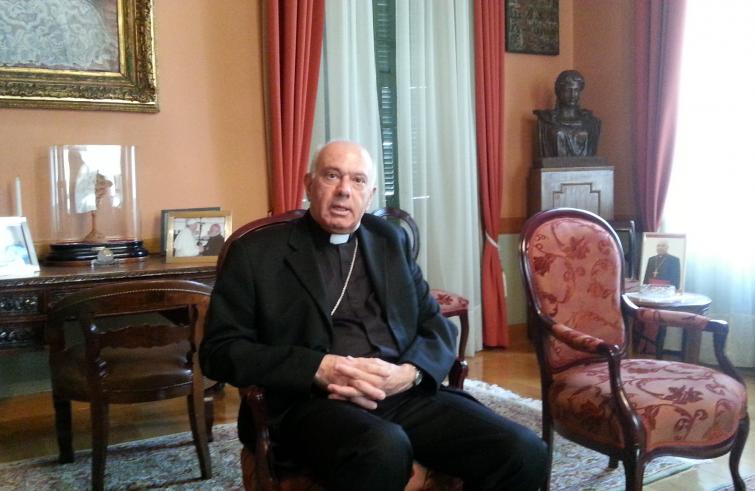
“We will exit the memoranda but restrictions will remain. In 2019, and perhaps also in 2020, we will undergo further pension cuts, while social security payments will increase. There is no talk of decreasing the tax burden or of benefits. The situation is serious and we see no glimpse of light at the end of the tunnel.”
The archbishop of Athens, President of Catholic bishops, Mons. Sebastianos Rossolatos, thus commented on Greece’s forthcoming termination of the bailout program set out by the Troika until August 20 2018, in a month’s time. For the Greek prelate “revitalizing employment, investments, and support to the young” are the top priorities the Government will need to address now that Greece is called to walk on its feet, albeit under the attentive supervision of Europe, determined to ensure the implementation of the cuts and reforms package that Greece was required to accept in order to recover from its public indebtedness and put public finances back on a sound footing. “I don’t know whether the Government will succeed in its objective of increasing investments and funding with measures for enterprise and job growth – remarked Msgr. Rossolatos -. Although tourism has a positive impact on our economy, it’s not enough for economic recovery. The government taxes employees and entrepreneurs at 60% of their earnings. It’s hard to restart with such a heavy burden.” Eight years of sacrifices have weakened the Country, said the archbishop, “now
The greatest fear of the Greek people is not being able to cope, that they will lose even the little they still had.
So many years of restriction and suffering have left deep scars, and we don’t know if and when they will be healed.”Thus all those who can, leave the Country. “Over 500 thousand young people have left Greece since 2010. What’s worse is that we don’t know if they will ever return. Those who leave are the most learned, the most talented. After having completed their studies here in Greece they bring their fruits elsewhere. The brain drain is a huge loss for Greece, that is bound to have long-lasting consequences.”
 The difficulties endured by the Country don’t prevent the Catholic Church in Greece “from always being in the frontline of support to the needs of the local population and of incoming refugees, regardless of their religious affiliation.”
The difficulties endured by the Country don’t prevent the Catholic Church in Greece “from always being in the frontline of support to the needs of the local population and of incoming refugees, regardless of their religious affiliation.”
It’s a major challenge for Greece’s small Catholic community, which, said Msgr. Rossolatos, “has very few resources and for this reason she depends on the support of other European and world Churches to continue her mission.”
Assisting the needy. According to the International Organization for Migration (IOM), the total number of migrants and asylum-seekers in Greece amounts to 49.927 people, 35.200 of whom – according to the UNHCR – arrived in 2017. Many of them, approximately 13 thousand people, are “blocked” in the islands of arrival where hotspots for their registration have been set up (Lesbos, Chios, Samos, Kos). These islands are once again experiencing problematic situations owing to precarious reception facilities, many of which consist in crowded encampments. On July 19 Doctors Without Borders denounced: “The steady increase in the number of migrants and refugees on the island of Lesbos has worsened the situation in the Moria refugee camp, which is plunging into chaos, marked by constant clashes and unrest, episodes of sexual violence and a worsening of the psychological conditions of thousands of people, over 8 thousand , trapped in the camp that has enough space for not more than 3 thousand people.In the main area of the Moria and Olive Grove camp there is a sanitation facility that serves 72 people, a shower every 84 people. These figures are well below the humanitarian standards recommended in situations of emergency.” Caritas Greece and Caritas Athens, along with CRS, Caritas United States, currently have two thousand places for reception in the Greek capital. A project is being developed with 800 beds in the north, in Thessaloniki.
Pastoral emergency. There is also another front – this time of an entirely pastoral nature –in which the Greek Catholic Church is engaged, not without difficulties. “With the arrival of migrants – said the President of Greek bishops – the Catholic population has increased fourfold.” Estimates by the Greek Church show that the Catholic population in Greece amounts to 400 thousand people, 50 thousand of whom are of Greek nationality. The Poles are the most numerous group (40 thousand), Philippinos (45 thousand), Iraqis (4 thousand), but there are also many Albanians, Ukrainians, Armenians, and Syrians. In addition to material needs, they also have spiritual and pastoral needs. “We need priests, places of worship, meeting places and of gathering for the faithful scattered throughout the Country. We can’t afford to rent or build places of worship because of the tax-burden. Our resources are insufficient and we need funds to cover the costs of our activities.”

Mons. Rossolatos expressed his “heartfelt gratitude” to the Italian Church “that supports us through a number of services carried out by Caritas especially in the area of reception to migrants as well as assistance to the poor and destitute”, he pointed out.
Unfortunately many projects risk being terminated. It’s a boomerang effect of the crisis , although “many want us to believe that it’s over.” The news that the bailout programme set out by the Troika for Greece is about to end, the archbishop said with bitterness, “was interpreted by many as a sign that the crisis has ended. For this reason, many benefactors and organizations are decreasing their support with negative repercussions on ongoing projects, that risk being stalled for lack of funding.” It’s the reason for the strong appeal to the “sister” Churches of Europe:
“Don’t abandon us. Don’t stop helping our Church.
Only in this way will we be able to continue our services for destitute people and for the migrant population in need. The Greek crisis is not over. Cuts and taxes have made us poorer. We don’t know how to carry on.”











